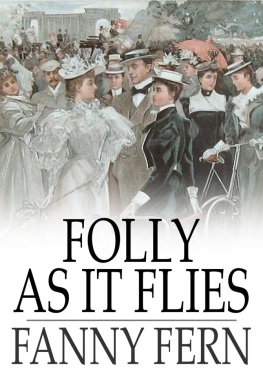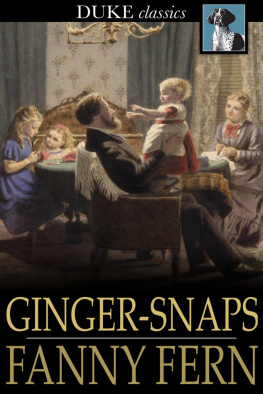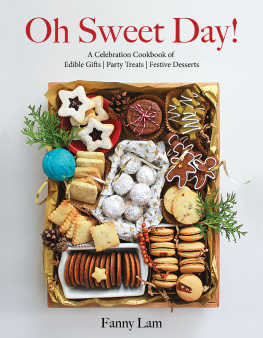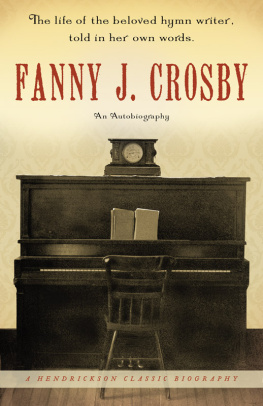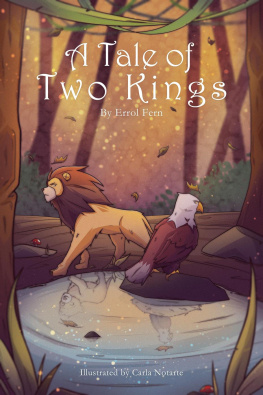FRESH LEAVES
* * *
FANNY FERN

*
Fresh Leaves
First published in 1857
Epub ISBN 978-1-77667-077-2
Also available:
PDF ISBN 978-1-77667-078-9
2014 The Floating Press and its licensors. All rights reserved.
While every effort has been used to ensure the accuracy and reliability of the information contained in The Floating Press edition of this book, The Floating Press does not assume liability or responsibility for any errors or omissions in this book. The Floating Press does not accept responsibility for loss suffered as a result of reliance upon the accuracy or currency of information contained in this book. Do not use while operating a motor vehicle or heavy equipment. Many suitcases look alike.
Visit www.thefloatingpress.com
Contents
*
*
TO
GRACE ELDREDGE,
WITH
Her Mother's Love.
Preface
*
Every writer has his parish. To mine, I need offer no apology forpresenting,
First, a new story which has never before appeared in print;
Secondly, the "hundred-dollar-a-column story," respecting theremuneration of which, skeptical paragraphists have afforded me so muchamusement. (N. B.My banker and I can afford to laugh!) This storyhaving been published when "The New York Ledger" was in the dawn of itspresent unprecedented circulation, and never having appeared elsewhere,will, of course, be new to many of my readers;
Thirdly, I offer them my late fugitive pieces, which have often beenrequested, and which, with the other contents of this volume, I hopewill cement still stronger our friendly relations.
FANNY FERN.
A Business Man's Home;Or, a Story for Husbands
*
CHAPTER I.
"There's your father, children."
The piano was immediately closed by the young performer, and themusic-stool put carefully away, that the new-comer might have anunrestricted choice of seats; a wide space was immediately clearedbefore the grate which had been carefully replenished with coal but halfan hour before; a stray cricket was hastily picked up and pushed beneaththe sofa, and an anxious glance was thrown around the room by Mrs. Wadeas her husband entered the room.
"Too much light here," said the latter, as he turned down the gasburner. "I hate such a glare. Waste of coal, too; fire enough to roastan ox, and coal seven dollars a ton;" and Mr. Wade seized the poker andgave the grate a vindictive poke.
Mrs. Wade sighedshe had too long been accustomed to such scenes todo any thing else. It was not the first time, nor the second, nor thehundredth, that her unwearied endeavors to make home cheerful had beenmet with a similar repulse; the young people, so gay but a momentbefore, skipped, one by one, out of the room, closing the doornoiselessly behind them as culprit-like they glided away.
"Heigh-ho," muttered Mr. Wade, as he threw himself down, boots andall, on the sofa, "heigh-ho."
"Does your head ache?" asked his patient wife.
"I want my tea," growled Mr. Wade, without deigning a reply.
Mrs. Wade might have answeredmost women wouldthat it had beenready this half-hour. She might also have said that she had just come upfrom the kitchen, where she had been to see that his favorite dish oftoast was prepared to his liking. She might also have said that she didnot like to order tea till he had signified his wish for itbut as Isaid before, Mrs. Wade had been too long in school not to have learnedher lesson well. So she merely touched her forefinger to the bell, forBetty to bring in the tea.
It was strong and hotMr. Wade could not deny it;the milk wassweet; so was the butter, the toast was unexceptionable, and enough ofit; the cake light, and the sweetmeats unfermented. Poor, ill-used Mr.Wadehe was in that most provoking of all dilemmas to a petulanttemper, there was nothing to fret about.
"There's the door bell," he exclaimed, inwardly relieved at the ideaof an escape-valve; "now I suppose I shall be talked deaf by that sillyMrs. Jones and her daughter, or bored by that stupid Mr. Forney; it'svery strange that a man can not enjoy his family one evening free frominterruption."
No such thingMr. Wade was cheated out of a fresh growl; the newarrival being a carpet-bag, and its accessory, Mr. John Doe, abrother-growler, whom Mr. Wade would rather have seen, if possible, thana new gold dollar. Mr. John Doe, as sallow as a badly-preserved pickle,and about as sweeta man all nerves and frownsa walkingthunder-cloud, muttering vengeance against any thing animate, orinanimate, which had the temerity to bask in the sunshine. Mr. John Doe,a worse drug than any in his apothecary's shop, who believed in theeternal destruction of little dead babies; turned the world into onevast charnel-house, and reversed the verdict of Him who pronounced it"very good."
"Ahhow d'ye dohow dy'e do?" said Mr. Wade, with an impromptulugubrious whine, as Mr. Doe ran his fingers through his grizzled locks,and deposited his time-worn carpet-bag in the corner; "it is pleasant tosee a friend."
"Thank you, thank you," replied Mr. Doe, lowering himself as carefullyinto his chair as if he was afraid his joints would become unriveted;"there's no knowing how many more times you may have to say that; thesesudden changes of weather are dreadful underminers of a man'sconstitution. Traveling, too, racks me to pieces; I can't sleep in astrange bed, nor get any thing I can eat when I wake, my appetite is sodelicate;sometimes I think it don't make much differencewe are poorcreaturesbegin to die as soon as we are bornhow do you do, Mr. Wade?You look to me like a man who is going to have the jaundice, eye-ballsyellow, etc.any appetite?"
"Not much," said Mr. Wade, unbuttoning his lower vest button, underwhich were snugly stowed away a pile of buttered toast, three cups oftea, and preserved peaches enough to make a farmer sick"not much;aman who works as hard as I do, gets too exhausted to eat when it comesnight, or if he does, his food does not digest; how's your family?"
"So, so," muttered Doe, with an expressive shrug; "children are agreat care, Mr. Wade, a great caremy John don't take that interest inthe drug business that I wish he did; he always has some book or otheron hand, reading; I am afraid he never will be good for any thing; yourbook-worms always go through the world, knocking their heads againstfacts. I shouldn't wonder, after all my care, if he turned out a poormiserable author; sometimes I think what is to be, will be, and there'sno use trying."
"Is not that fatalism?" quietly interposed Mrs. Wade, blushing thenext moment that she had so far departed from "The Married Woman'sGuide," as to question an opinion which her husband had indorsed by hissilence. "Children are a great care, 'tis true, but it always seemed tome that the care brought its own sweet reward."
Mr. Doe wheeled round to look in the face this meek wife, whosedisappointed heart, turning to her children for that comfort which shehad in vain looked for from her husband, could ill brook that the valueof this coveted treasure should have such depreciating mention.
"Pshaw! what signify words?" said her husband. "I hate argument;besides, women can't argueevery body knows that; and every body knowsthat if a man wants his children to do, or be, one thing, they are sureto do, or be, just the opposite. I've no doubt it will turn out just sowith ours; there is no counting on 'em. In my day, if a man was afarmer, his son was a farmer after him, and never thought of being anything else. Nowadays, children have to be consulted as to 'their bent.'Fudgefiddlestick; their bent is for mischief and dodging work, and atight rein and a good smart rod is the best cure for it."


